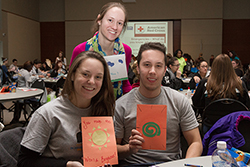Stockton Named to Kiplinger’s Top 100 Best Values in Public Colleges
Stockton has been named to Kiplinger’s Personal Finance’s list of 100 best values in public colleges for 2015. The ranking cites four-year schools that combine outstanding academics with affordable cost.
“New Jersey’s Distinctive Public College is pleased to be recognized by Kiplinger’s on the value of a Stockton education,” said President Herman Saatkamp. “Stockton’s small class sizes and distinguished faculty, 96 percent of whom hold the highest degree in their fields, offer students the personal attention and hands-on opportunities of an elite, private college, at a public price.”
Kiplinger’s collected data from a total of 1,200 schools, provided by Peterson’s Undergraduate Database. Stockton was also named to the Top 300 best values among private liberal arts colleges, private universities and public colleges, the first time the college has been recognized by Kiplinger’s.
Kiplinger’s assesses quality according to measurable standards, including the admission rate, the percentage of students who return for sophomore year, the student-faculty ratio and the four-year graduation rate. Cost criteria include sticker prices, financial aid and average debt at graduation.
“We salute this year’s top schools,” says Janet Bodnar, editor of Kiplinger’s Personal Finance magazine. “Balancing top-quality education with affordable cost is a challenge for families in today’s economy, which is why Kiplinger’s rankings are such a valuable resource. The schools on the 2015 list offer students the best of both worlds.”
The complete Kiplinger’s rankings are available online. The rankings will also appear in the February 2015 issue of Kiplinger’s Personal Finance.
Stockton’s 11th Annual Dr. Martin Luther King Day of Service Draws Nearly 1,000 Volunteers

Julie Eller, a Public Health major, Corrine Wilsey, a Stockton graduate who is now a program assistant in the School of Health Sciences, and Brandon Pluchino, a Marketing major, made cards for active duty military personnel on MLK Day of Service.
Nearly 1,000 faculty, staff and student volunteers from Stockton and members of communities throughout South Jersey honored the legacy of Dr. Martin Luther King Jr. through community projects and social activism on Jan. 19.
Stockton’s 11th Annual Dr. Martin Luther King Day of Service generated “the most community involvement ever,” said Daniel Fidalgo Tomé, director of Service-Learning at the college. “It was extremely rewarding to see Stockton as a beacon of community engagement.”
To put it in perspective, “in the first year, we had about 70 people,” said President Herman Saatkamp, who began Day of Service here in 2004. “Today we’re approaching 1,000 people at all the sites.”
“What we’re doing is building a community,” he said.
Service projects took place at the main Galloway campus, the Carnegie Center in Atlantic City, Kramer Hall in Hammonton, the Manahawkin instructional site, the Sam Azeez Museum of Woodbine Heritage and at locations throughout the surrounding communities.
Among the dozens of projects were cleanups at The Arc of Atlantic County, the Atlantic County Utilities Authority’s greenhouse, the Noyes Museum of Art of Stockton, and the South Jersey Horse Rescue, as well as a Stockton WaterWatch campus cleanup. Students also helped build a playground at the Unitarian Universalist Congregation in Galloway, distribute clothing through the Eastern Service Workers Association and teach Stockton EMS CPR.
In Ocean County, students helped the Coastal Volunteers in Medicine in Barnegat and painted at the Tuckerton Seaport and Baymen’s Museum. At Stockton’s instructional site in Woodbine, a fire safety seminar was offered. Scores of volunteers at Hammonton’s Kramer Hall helped with cleanups at the Eagle Theatre and the Hammonton Arts Center, made Valentine’s cards for patients at the Greenbrier Nursing Home, provided support for Allies in Caring and offered CPR training.
Day of Service is hosted by the Office of the President, the Office of Service-Learning and the Office of Student Development with campus-wide support.
To view photos from the event, click here.
Stockton, Rowan’s Osteopathic Medicine to Offer Dual Degree

Stockton's Unified Science Center
Stockton and Rowan University School of Osteopathic Medicine have announced a dual degree program that will provide students with the opportunity to earn a bachelor’s degree from Stockton and a Doctor of Osteopathic Medicine degree from RowanSOM at an accelerated pace.
The program consists of at least 96 semester credit hours (approximately three years) of undergraduate study at Stockton and four years of study of osteopathic medicine at RowanSOM, enabling students to graduate with two degrees in seven years, rather than eight. Osteopathic medicine emphasizes prevention and primary care, and takes a holistic approach to treatment.
“Careers in science and medicine are among the most in demand, while opportunities for doctors are expanding with each scientific advance,” said President Herman Saatkamp. “This agreement helps increase the value of students’ educations while reducing the cost, and enables them to earn degrees from two prestigious institutions of higher learning in New Jersey.”
“Within the next decade, New Jersey will face a severe shortage of physicians, particularly those who practice primary care,” said Dr. Thomas A. Cavalieri, dean of RowanSOM. “This agreement to expand access and to make medical education more affordable, along with RowanSOM’s history of leading the state’s medical schools in training primary care physicians, will go a long way towards helping to avoid that shortage.”
The first students will be admitted to the program in Fall 2015.
HESIG Report Recommends Changes to Make Higher Education More Affordable, Effective
Stockton’s Higher Education Strategic Information and Governance Project (HESIG) recently issued a report that recommends these changes to make college more affordable and easier to complete, and to give students the skills they need to succeed in the workforce:
• Broaden partnerships with high schools to teach subjects and skills needed to succeed in college and the workforce, and grant college-level credit for those courses; partner with community colleges on credit transfer to shorten time needed to complete a degree and to reduce college cost;
• Expand partnerships with businesses to help build programs that combine workforce and academic skills, and to create internships;
• Reduce the number of degree credits required for graduation by giving credit for evidence of knowledge gained outside of college;
• Provide a clearly articulated set of specific abilities across disciplines that college graduates are expected to master, such as effective writing, speaking, and decision making; and workplace skills such as teamwork, punctuality and tolerance of diversity.
• Restructure student financial aid for different types of students, programs and institutions to increase affordability, and reduce debt; and prioritize support for success programs for low-income, first-generation, and adult students.
“HESIG’s work to promote college access, affordability and quality is critically important to the future of higher education,” said President Herman Saatkamp. “Stockton is pleased to work with our state and national partners to enable more students to further their educations, and to reap the value of a college degree throughout their lives.”
The HESIG report offers policy recommendations and a “tool kit” of best practices for New Jersey colleges and state policy makers to help narrow the “achievement gap” for college-bound students, and to add value to the college outcomes. It was underwritten in part by a grant from the ETS Center for Advocacy and Philanthropy, with support from the William J. Hughes Center for Public Policy, Stockton Polling Institute and New Jersey City University.
The 2014 initiative titled “Finding Solutions, Building Public Trust in an Era of Change,” engaged citizens and executives on the role of higher education in helping to secure the long-term prosperity of the state. The HESIG project accomplished this by: convening two “executive roundtable” forums of state leaders from business, education, government, the media; and conducting a statewide survey of citizens to test the support for needed educational change to increase college value. The roundtables were held at Stockton and New Jersey City University.
HESIG Senior Fellow Darryl Greer, who headed the project, said: “What’s at stake is citizens’ future opportunity to compete and prosper in New Jersey. This initiative goes to the heart of fulfilling the promise of the benefit of a college education.”
The report notes that executives and citizens polled agree that adding more practical experience for students while in college would make higher education more valuable, and that top skills to be gained from college include: writing and speaking clearly; and problem solving.
Dr. Harvey Kesselman, provost and executive vice president, noted that these skills are a high priority for Stockton students, as part of the faculty-developed Top 10 Learning Outcomes.
Summaries of the executive roundtables, participants, and survey findings are at: www.stockton.edu/hughescenter/hesig.
Stockton Statistic
Stockton’s Coastal Research Center (CRC) has been collecting beach and near-shore profile data at 105 locations along New Jersey’s 210-mile shoreline since 1986.
The CRC recently analyzed dune protection along the coast with pre- and post- Hurricane Sandy data. Of the 105 locations in the New Jersey Beach Profile Network, 63 contained a beach that was backed by a natural, man-made, or federally-designed dune. The center's research showed 21 of the 63 dunes experienced dune failure and 42 remained intact.
To learn more about the Coastal Research Center’s findings, read the article, “Hurricane Sandy: Beach-dune performance at New Jersey Beach Profile Network sites,” recently published in the Shore & Beach journal.
Stockton Home | President's Office Home



